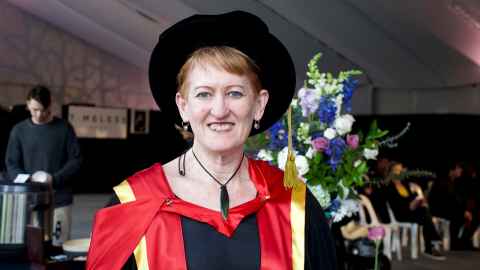Easing the way for bicultural engagement
27 September 2018
How Māori and Pākehā engage face-to-face, and develop strong relationships across difference, was at the core of PhD research by Dr Frances Hancock who graduated from the Faculty of Education and Social Work this week.

“And in the end, I found, it is the simple things that matter so much, such as kindness, humour, integrity and perseverance, being genuinely helpful, authentic, and open to learning, and exercising good manners,” she says.
Frances’ research was based on deep conversations with three pairs of longstanding colleagues. In each pair, one was Māori, one Pākehā. All are highly regarded and experienced professionals who have worked across a range of fields: health, education, the environment, Treaty settlements, philanthropy, justice, and community development.
“This was an unusual approach,” Frances explains. “We talked over many months face-to-face, on the phone and over email. Working in pairs allowed me to get to know individuals looking through the eyes of their colleague.”
These rich conversations gave Frances the material to develop her research on creating respectful, responsible, learning and even affectionate relationships with colleagues who are different from one another.
“My research shows that difference is not an uncrossable divide and there is a lot that goes on in our everyday relationships that is about being human together, rather than being Māori or Pākehā, although we are of course always that and coexist in a society that treats us differently,” says Frances.
“And what happens in our everyday engagements says something about who we are becoming as a nation, how we deal with power imbalances, and what we value or are willing to sacrifice.”
Although Māori-Pākehā relations were central to Frances’ research, she believes the knowledge in her thesis can be applied beyond the troubled history these two groups share.
“My research can help people to work more productively together – in communities, organisations, hospitals, schools, universities and government – because really what matters is who we are and how we are together. None of us get it right all of the time and there is always so much to learn. But we each have something unique to offer the world.”
“The pace of life and the complex histories we share can challenge those simple ideas and practices many of us learnt growing up. My research reminds us to slow down and remember to be gracious and humble, kind and generous, responsible and brave, and to look after ourselves so our relationships can last the distance.”
Frances describes herself as an Irish Pākehā. Her thesis, Becoming just, doing justice: The ethics and politics of Māori–Pākehā relations, also reflects decades of her own experiences of cross-cultural work with Māori people and groups in Aotearoa New Zealand and with First Nation peoples in the US.
Her work in the States followed her graduation from Harvard with a Masters of Theological Studies in the late 1980s, made possible by a Fulbright and Frank Knox Memorial Fellowship. Her academic path began with a first-class honours degree in social work from Massey University.
With a record of outstanding academic achievement, Frances was awarded a University of Auckland Doctoral Scholarship for three and a half years of PhD study. She was also able to attend an international storytelling conference at Oxford University where she presented a paper, later accepted for publication.
Frances completed her thesis the day before the scholarship ended. “But only with incredible support, particularly from my supervisors Professor Alison Jones and Dr Te Kawehau Hoskins who were also one of the ‘pairs’ in my research.”
She goes on to say: “It doesn’t seem possible that my doctorate is now done and dusted, but my graduation tells me it is. I felt at the ceremony, as I have many times in recent years, te korowai atawhai (the cloak of kindness) wrapped around my shoulders by Te Puna Wānanga staff and their Faculty colleagues. During the ceremony Dr Hinekura Smith, my PhD buddy who is now a lecturer at the University, gave a spine-tingling Karanga. My eyes moistened and even the Chancellor smiled. He winked at me as he shook my hand and conferred my degree!”
Frances is a writer and scholar active in community projects including SOUL - Save Our Unique Landscape – which is fighting to protect and conserve land at Ihumaatao from a proposed high-cost housing development. She is planning to produce a book and academic papers from her research and continue working with the communities she loves.
Media queries
Alison Sims | Media adviser
Tel: 09 923 4953
Mob: 021 249 0089
Email: alison.sims@auckland.ac.nz